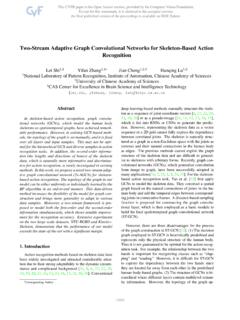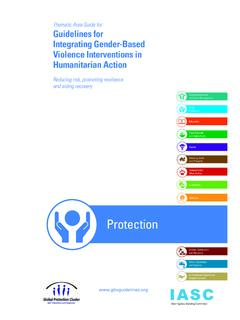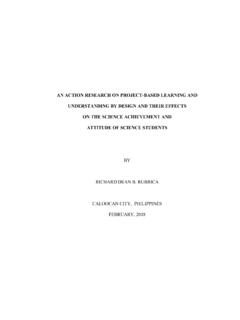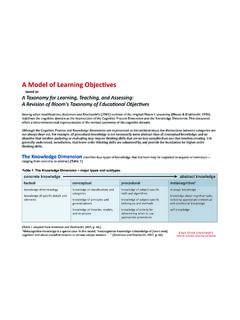Transcription of INQUIRY-BASED LEARNING - National Action Alliance for ...
1 INQUIRY-BASED LEARNING : AN APPROACH TO EDUCATING AND INSPIRING KIDS. INQUIRY-BASED LEARNING is not a new technique in fact, it goes back to education philosopher John Dewey but it does stand in contrast to the more structured, curriculum-centered frame- work of today's schools. Asking questions is at the heart of INQUIRY-BASED LEARNING . The goal is not to ask just any ques- tions, of course, but ones that kids honestly care about. Your role is to guide the kids in finding the answers themselves and encourage them to ask new questions along the way. INQUIRY-BASED LEARNING is a style particularly well-suited for out-of-school programs because they have a freer hand to complement, enhance, and expand on the work children are doing in their K-12 classes.
2 School- based teachers may not want to go so far as to make INQUIRY-BASED LEARNING the core of their classroom approach. It does, however, offer a powerful option for occasional projects and lab activities. This resource explains some of the key principles of INQUIRY-BASED LEARNING and offers step-by- step information on how to create an INQUIRY-BASED project. KEY PRINCIPLES OF INQUIRY-BASED LEARNING . INQUIRY-BASED LEARNING is one of many terms used to describe educational approaches that are driven more by a learner's questions than by a teacher's lessons. It is inspired by what is sometimes called a constructivist approach to education, which posits that there are many ways of constructing meaning from the building blocks of knowledge and that imparting the skills of how to learn is more important than any particular information being presented.
3 Not all INQUIRY-BASED LEARNING is constructivist, nor are all constructivist approaches inquiry - based , but the two have similarities and grow from similar philosophies. How is INQUIRY-BASED LEARNING different from traditional approaches? In the traditional framework, teachers come to class with highly structured curricula and activity plans, some- times referred to as scope and sequence. They act as the source of knowledge and as the person who determines which information is important. There is certainly creativity and flexibility in how each teacher runs his or her class, but the topics and projects are driven and evaluated based on what a teacher, administrator, school board, or bureaucracy have decided what children should know and master.
4 It may be that traditional education will start becoming more and more like INQUIRY-BASED LEARNING over time. Why? Because an INQUIRY-BASED approach is more web-like in how stu- dents pursue knowledge, as opposed to the linear, vertical and compartmentalized struc- ture of traditional education. As the web-like Internet increasingly permeates society and education, the traditional structures will have to adapt to the forms of the new media. In contrast, INQUIRY-BASED LEARNING projects are driven by students. Instructors act more as coaches, guides, and facilitators who help learners arrive at their true questions the things they really care about.
5 When students choose the questions, they are motivated to learn and they develop a sense of ownership about the project. Don't get the wrong idea, however: INQUIRY-BASED LEARNING projects are not unstructured;. they are differently structured. If anything, they require even more planning, preparation, and responsiveness from the educator it's just that the educator's role is different. ADVANTAGES OF INQUIRY-BASED LEARNING . Instructors who adopt an INQUIRY-BASED LEARNING approach help students identify and refine their real questions into LEARNING projects or opportunities. They then guide the subsequent research, inquiry , and reporting processes.
6 Since one role of out-of-school programs is often to enhance, support, and expand on the core curriculum of K-12 schools, it's a particularly good approach for giving kids an opportunity to learn with more freedom while reinforcing and imparting basic skills. INQUIRY-BASED LEARNING has other advantages as well: An INQUIRY-BASED LEARNING approach is flexible and works well for projects that range from the extensive to the bounded, from the research-oriented to the creative, from the laboratory to the Internet. It is essential, however, that you plan ahead so you can guide kids to suitable LEARNING opportunities.
7 2016 Education Development Center, Inc. 1. You'll find that many kids who have trouble in school because they do not respond well to lectures and memorization will blossom in an INQUIRY-BASED LEARNING setting, awakening their confidence, interest, and self-esteem. The traditional approach tends to be very vertical: the class studies science for a while, for example, then language arts, then math, then geography. In contrast, the INQUIRY-BASED approach is at its best when working on interdisciplinary projects that reinforce multiple skills or knowledge areas in different facets of the same project. You'll also find that although the traditional approach is sharply weighted toward the cognitive domain of growth, INQUIRY-BASED LEARNING projects positively reinforce skills in all three domains.
8 Physical, emotional, and cognitive. INQUIRY-BASED LEARNING is particularly well-suited to collaborative LEARNING environments and team projects. You can create activities in which the entire class works on a single question as a group (just be sure that the whole group truly cares about the question) or in teams working on the same or different questions. Of course, INQUIRY-BASED LEARNING also works well when you've decided to let each student develop an individual project; when doing so, however, be sure to incorporate some elements of collaboration or sharing. An INQUIRY-BASED approach can work with any age group.
9 Even though older students will be able to pursue much more sophisticated questioning and research projects, build a spirit of inquiry into activities wherever you can, even with the youngest, in an age-appropriate manner. The INQUIRY-BASED approach acknowledges that children, especially children from minority and disadvantaged communities, have what researcher Luis Moll calls funds of knowledge that are often ignored by traditional curricula. An INQUIRY-BASED approach validates the experience and knowledge that all kids bring to the LEARNING process. THE ART OF THE QUESTION. Because INQUIRY-BASED LEARNING is premised on helping children ask questions, instructors themselves must learn the art of asking good questions.
10 As the leader and guide, remember that you have to model the spirit of inquiry . Be aware of how a question can either shut down or open up a conversation by the words you choose and the prejudices you reveal. For example, consider the different responses you'd get to the question Nobody here has ever created a Web page, have they? versus Has anyone made a Web page before? versus What do we know about creating Web pages? The second question is at least a more positive version then the first, but it still will only get you yes or no answers. The third invites constructive input and validates prior knowledge.

![arXiv:1801.07455v2 [cs.CV] 25 Jan 2018](/cache/preview/c/1/f/1/b/a/a/5/thumb-c1f1baa5f6e090b207f4f18380d23ecd.jpg)





